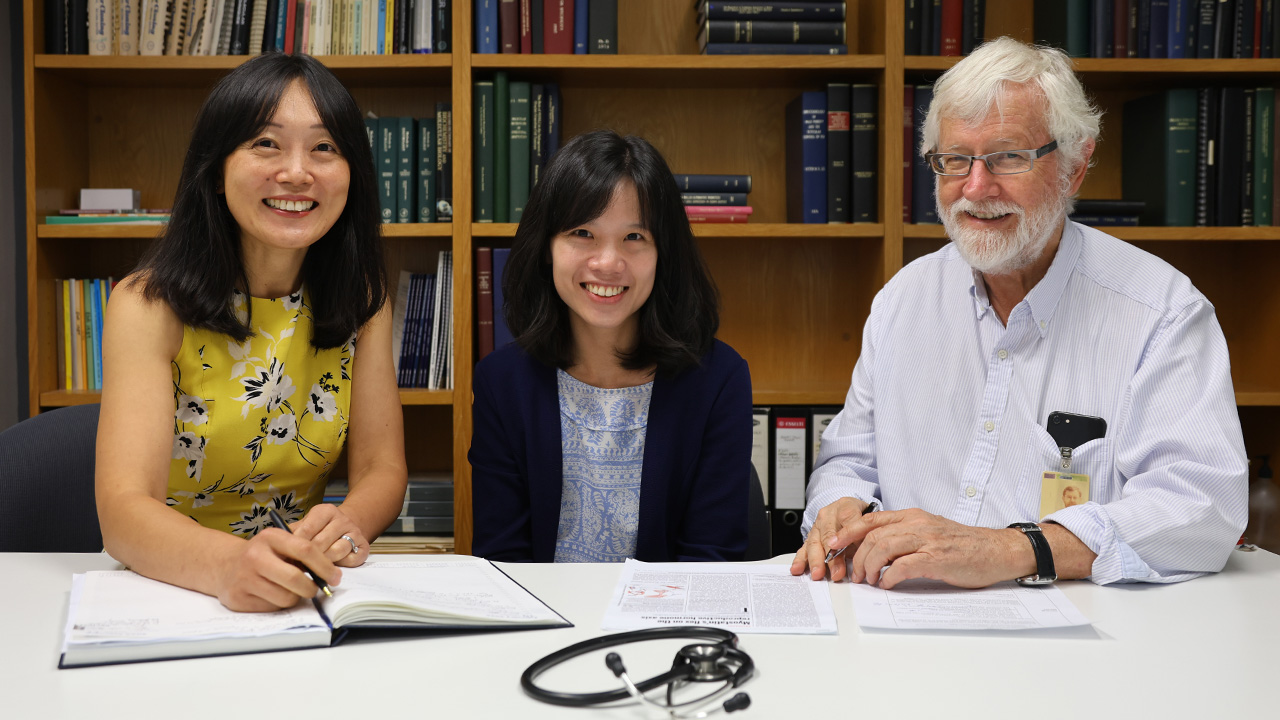
A/Prof Jun Yang, Dr Renata Libianto, and Prof Peter Fuller.
A unique form of hypertension or ‘high blood pressure’, known as primary aldosteronism (PA), is now recommended to be screened as a routine part of hypertension management.
Monash Health Consultant Endocrinologist Associate Professor Jun Yang initiated and led an international study that developed a list of criteria as a standardised way to assess medical treatment outcomes for primary aldosteronism (PA). Data from Monash Health collated by clinician-researcher Dr Renata Libianto contributed to the study.
PA is caused by overactive adrenal glands that produce too much aldosterone, a salt-retaining hormone, resulting in fluid retention and increased blood pressure.
At least 10% of the 1.2 billion people globally with high blood pressure have PA, which cannot be effectively treated by the usual blood pressure-lowering medications. Less than 1% of them are aware of their unique condition.
A/Prof Yang and her team’s work also contributed to the guidelines from the Endocrine Society (of USA), which recommends screening for PA in all hypertensive adults for the first time.
A/Prof Yang, who is also the Head of the Endocrine Hypertension Research Group at Hudson Institute of Medical Research, co-leads the NHMRC Primary Aldosteronism Centre of Excellence (PACE) with Professor Peter Fuller, Head of Endocrinology at Monash Health.
She said PA affects an estimated 600,000 in Australia alone, but it’s often undiagnosed or undertreated, and that has a huge impact on cardiovascular health.
‘Having a set of criteria for assessing people who are being treated will hopefully help to standardise both clinical practice and research of primary aldosteronism.
‘It will unify how people with this condition are managed, using the same set of rules, and it also makes it easier for researchers to report treatment outcomes using a single assessment protocol – so it helps to standardise both clinical practice and research,’ she said.
‘Once there is a clear guideline for monitoring, it may even make it more appealing for people to test for PA; the more clarity there is around a condition – its diagnosis, treatment and assessment – the more likely it will be that doctors will look for this potentially curable disease.’
There’s hope that the new guidelines and increased recognition of PA will lead to better outcomes for those with the condition.
Hypertension facts (source: World Health Organization)
- An estimated 1.28 billion adults aged 30–79 years worldwide have hypertension, most (two-thirds) living in low- and middle-income countries
- An estimated 46% of adults with hypertension are unaware that they have the condition.
- Less than half of adults (42%) with hypertension are diagnosed and treated.
- Approximately 1 in 5 adults (21%) with hypertension have it under control.
- Hypertension is a major cause of premature death worldwide.
- One of the global targets for noncommunicable diseases is to reduce the prevalence of hypertension by 33% between 2010 and 2030.
Primary aldosteronism facts (source: Hudson Institute of Medical Research)
- In primary aldosteronism, the adrenal glands, which sit on top of each kidney, produce too much aldosterone (a hormone that retains salt in the body).
- This can lead to excess salt and fluid retention and increased blood pressure. It also increases the risk of heart arrhythmia, heart attack and stroke more than ordinary forms of hypertension.
- Primary aldosteronism affects five to 10 per cent of those with hypertension but often goes undiagnosed.
- It is treatable with medication and/or surgery, depending on the cause.
- If undiagnosed, PA can lead to higher blood pressure that becomes increasingly difficult to control with medication.
- This can leave those who have it at risk of strokes, heart attacks at a younger age and in some cases heart and kidney failure. Others may end up taking numerous ineffective blood pressure medications while still suffering from high blood pressure.
- If correctly diagnosed, management of PA-based hypertension can often be achieved with appropriate medication or surgery.


